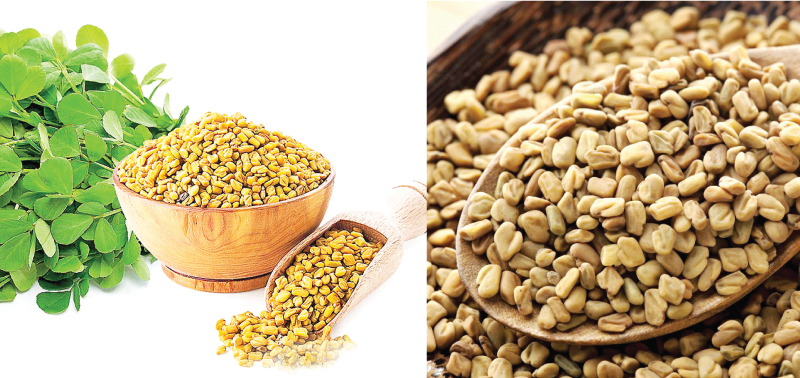Fenugreek is a plant from the family of leguminisae that grows annually. It is cultivated in the Mediterranean and Asian countries. Fenugreek seeds are hard, yellowish brown and angular shaped seeds. From ancient times, it has been used for the medicinal effects due to its chemical composition. It has been reported that its endosperm has highest saponin and protein content, whereas husk has higher total polyphenol and total dietary fiber. Although fenugreek is relatively low in mineral content some minerals are presented in good concentrations such as phosphorus and sulphur. Curries made from fenugreek have a high amount of calcium, Iron and zinc. Germinated fenugreek seeds showed more beneficial than dried seeds due to the fact that bioavailability of different constituents of fenugreek seeds increases by germination. Flavonoids, saponins and alkaloids and steroidal sapiogens are kind of bioactive compounds presented in seeds.
Fenugreek seeds are having several benefits such as antidiabetic, anticarcinogenic, antioxidant, antibacterial agent, antianorexia agent and gastric stimulant as well as remedy for hypocholesterolemia (low level of cholesterol in the blood) and hypoglycemia (low level of glucose in the blood). In diabetic management, there is an existence of fiber and its efficacy on blood and serum glucose management and insulin production. In here, soluble fiber of fenugreek seeds postpones digestion and absorption of carbohydrates resulting in the improvement of glucose homeostasis. Extensive gel formation and low viscosity o the gels in the intestine delay the gastric emptying and decreasing the intestinal transit time of the food mass. This extensive gel formation tends to trap the glucose inside the gel that will help to prevent the sudden rise of the blood glucose level. This viscous and gel forming properties of soluble fiber prevent glucose absorption and reduce post prandial glucose response.
When it comes to the cholesterol lowering effect, dietary fiber has the role especially the soluble fiber counterparts such as betaglucans and galactomannas in the management of hypercholesterolemia (total cholesterol level is high in blood). Furthermore, soluble fiber fractions reduce only the dangerous low density lipoproteins (LDL) and triglycerides (TAG) intake whereas keeping the good high density lipoproteins (HDL) intact. Soluble fiber is act as a hypolipidemic agent by its biochemical mechanism. In here, biochemical mechanism can be explained by the capacity of soluble fiber to bind bile acids. Bile acid are excreted rather than recycled to the blood reduced cholesterol fermentation of soluble fiber by bacteria in the clone produces short chain fatty acids (SCFA) which can reduce cholesterol synthesis.
Fenugreek and fiber could be useful for treating constipation and hinder the development of diverticulosis and diverticulitis. (Diverticulosis – small, bulging pouches develop in wall of digestive tract, diverticulitis – one/more of these pouches become inflamed or infected). It promotes the normal location which can make the waste bulky, soften the stool by holding water and minimize the transit time through the intestine. It helps to keep constant and steady stool time.
Fenugreek seed extract is effective in reducing the body and adipose tissue weights. The mechanism may be due to flushing out of the carbohydrate from the body before entering the blood stream by forming a gelatinous structure from high content of soluble fiber. In turn the effects on slowing the digestion and absorption of food from the intestine and creates a sense of satiety.
In anticarcinogenic effect and antioxidant activity of fenugreek seed, low consumption of fiber in a diet can induce colon cancers and irritable bowel syndrome. Dietary fiber produces short chain fatty acids like butyrate by anaerobic bacterial fermentation which protect against colon carcinogenesis. Incorporation of fenugreek seed in the diet modulates the activity of beta-glucoronidase and mucinase and inhibits colon carcinogenesis. Activity of beta- glucoronidase significantly decreased the free carcinogens, which were not affective on colonocytes. Mucinase helped in hydrolyzing the protective mucin and this was correlated with the presence of fiber, flavonoids and saponins. Fenugreek possesses a great antioxidant property that has a beneficial effect on the liver and pancreas because of its phenolic and flavonoid compounds. It has been stated that fenugreek seed extract scavenges hydroxyl radicals and inhibit H2O2- induced lipid oxidation in the liver mitochondria.
Fenugreek is one of the most frequently used galactagogues that stimulate breast milk secretion. Fenugreek has estrogenic activity that is effective on breast milk production.
Fenugreek is rich in fiber, protein and due to its valuable bioactive components from that fenugreek act as antidiabetic, antioxidant, anticarcinogenic, hypoglycemic and hypocholesterolemic activities. Based on these healthy benefits, fenugreek can be recommended to be a part of our daily diet and incorporated into foods in order to produce functional foods.



Add new comment